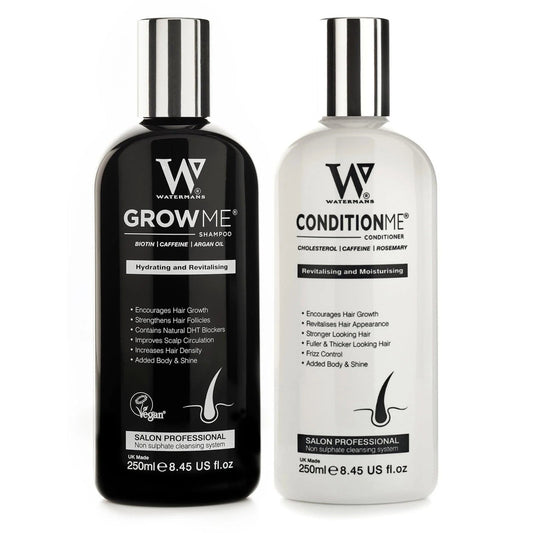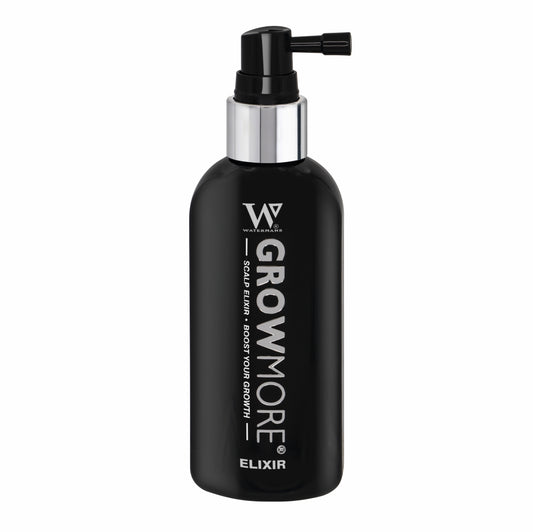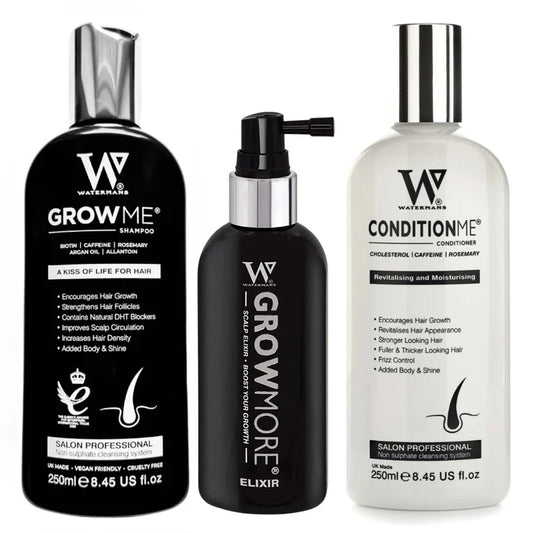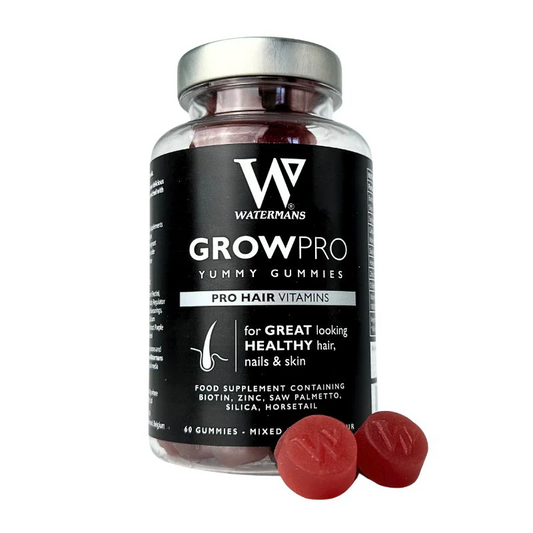Exploring Hypotrichosis: Understanding Causes, Types, and Treatment Options for Hair Loss
Share

Hypotrichosis is a term that refers to a condition characterized by hair loss, specifically a reduction in the amount of hair on the scalp or body. This phenomenon can range from mild thinning to complete baldness, and it can affect individuals of all ages. Understanding hypotrichosis is essential for anyone encountering hair loss, and it can help guide you towards the most effective treatments.
If you're looking for a natural solution to combat hair loss and promote hair growth, consider trying Watermans Grow Me Shampoo. This shampoo is formulated with biotin, rosemary, caffeine, niacinamide, argan oil, allantoin, and lupin protein, known for energizing the scalp and volumizing hair from the roots.
What is Hypotrichosis?
Hypotrichosis is a genetic condition that results in less hair than normal. It can occur in various forms, affecting facial hair, body hair, or hair on the scalp. The cause of hypotrichosis can be inherited, meaning it runs in families, or it may develop as a result of an underlying health condition.
Causes of Hypotrichosis
There are several potential causes of hypotrichosis:
1. Genetic Factors
Hypotrichosis often stems from genetic mutations that specifically affect hair follicle development. Many types of hypotrichosis are hereditary, meaning they can be passed down through generations. Common hereditary types include:
- Androgenetic Hypotrichosis: Also referred to as male or female pattern baldness, it is the most common form of hair loss resulting from genetic predisposition and hormonal changes.
- Congenital Hypotrichosis: Present at birth, this type can lead to sparse or absent hair growth from birth throughout life.
2. Hormonal Changes
Hormones can play a significant role in hair growth. Conditions that lead to hormonal imbalances, such as polycystic ovary syndrome (PCOS) or thyroid disorders, may increase the likelihood of experiencing hair loss.
3. Nutritional Deficiencies
A lack of essential nutrients in the diet can lead to hair thinning or loss. Key nutrients that support hair health include proteins, vitamins A, C, D, E, and minerals like zinc and iron.
4. Medical Conditions
Certain medical conditions and autoimmune disorders can contribute to hypotrichosis. For instance, alopecia areata is an autoimmune disorder that can cause sudden hair loss.
5. Medications
Some medications, particularly those that treat cancer, arthritis, depression, or heart conditions, have hair loss as a possible side effect.
Types of Hypotrichosis
Different types of hypotrichosis can present themselves based on their causes and genetic factors:
1. Nonsyndromic Hypotrichosis
This type occurs in isolation, meaning it's not associated with any other health condition.
2. Syndromic Hypotrichosis
Associated with additional syndromes, this type includes multiple symptoms and conditions besides hair loss. Examples include:
- Hypotrichosis with Anhidrosis: Results in hair loss and the inability to sweat due to affected sweat glands.
- Hypotrichosis and Nail Dysplasia: Characterized by sparse hair and abnormal nail growth.
Symptoms of Hypotrichosis
The primary symptom of hypotrichosis is, of course, hair loss. This can manifest in different ways:
- Thinning hair or bald patches on the scalp
- Sparse hair in body areas typically covered with hair
- Changes in hair texture or growth patterns
Diagnosing Hypotrichosis
If you suspect you are experiencing hypotrichosis, a healthcare professional can carry out the necessary evaluations. Diagnosis may involve:
- Physical Examination: Assessing hair density and scalp condition.
- Family History Review: Exploring genetic involvement and family patterns in hair loss.
- Blood Tests: Checking for nutritional deficiencies or hormonal imbalances.
- Biopsy: Taking a small skin sample from the scalp for microscopic examination, if required.
Treatment Options for Hypotrichosis
Once diagnosed, treatment for hypotrichosis may vary based on the underlying causes and specific type. Here are some options:
1. Topical Treatments
Minoxidil is a common topical treatment promoting hair growth, its effectiveness proven for various types of hair loss.
2. Oral Medication
In some cases, doctors may prescribe medications such as finasteride for androgenetic hypotrichosis, specifically for men.
3. Lifestyle Changes
Improving diet and ensuring you are receiving the necessary vitamins and minerals can work wonders. Consider integrating the following nutrients:
- Biotin: Supports keratin production, and can be found in foods like eggs and nuts.
- Omega-3 Fatty Acids: Promote hair density and shine found in fatty fish and flaxseeds.
4. Natural Remedies
Incorporating natural solutions can also help combat hair loss. One such option is using Watermans Grow Me Shampoo, known for its potent natural ingredients. Regular use can revive and fortify your hair.
Embracing Hair Loss: Coping Mechanisms
- Wigs & Hairpieces: Many individuals choose to cover their hair loss with wigs or hairpieces, which offer a variety of styles and colors.
- Hairstyling Techniques: Educational styling can make thinning hair less noticeable.
- Psychological Support: Connecting with others who experience similar issues can help with mental health.
Did You Know?
- Did you know that approximately 50 million men and 30 million women in the United States experience some form of hair loss?
- Did you know that hair follicles go through a cycle of growth, rest, and shedding, and it's normal to lose about 50 to 100 strands a day?
- Did you know that certain hairstyles like tight ponytails can contribute to a form of hair loss called traction alopecia?
Q&A Section
-
What is the difference between hypotrichosis and alopecia?
- Hypotrichosis refers to a significant reduction in hair density, while alopecia generally refers to specific hair loss patches or complete baldness.
-
Can hypotrichosis be cured?
- There is no definitive cure, but many individuals can manage the symptoms and enhance their hair growth through treatments.
-
Are there specific diets to promote hair growth?
- Yes, consuming foods rich in vitamins A, C, D, E, along with protein and healthy fats, can support hair growth.
-
Can stress lead to hypotrichosis?
- Yes, high-stress levels can trigger hair loss, including conditions like alopecia areata.
-
Is it common to have family members with hair loss?
- Absolutely, hypothrichosis often has a genetic component, so having relatives with similar issues is quite common.
-
When should I see a doctor about my hair loss?
- Consider consulting a doctor if you're experiencing sudden or distressing hair loss.
-
How long does it take to see improvements from treatments?
- Improvement timelines may vary but often take several months of consistent treatment.
-
Is hypotrichosis more common in men?
- Yes, hereditary forms like androgenetic hypotrichosis are more prevalent in men than in women.
-
Can hair color impact the visibility of hair loss?
- Yes, lighter hair colors may make thinning hair less noticeable than darker colors.
-
How do I determine the best treatment for my hypotrichosis?
- Consulting a healthcare provider is essential to develop a tailored treatment plan based on individual needs.
This comprehensive guide on hypotrichosis provides a solid overview of the condition, potential causes, treatment options, and coping mechanisms. Remember, if you're dealing with hair loss, consider exploring Watermans Grow Me Shampoo for a natural hair growth solution.



